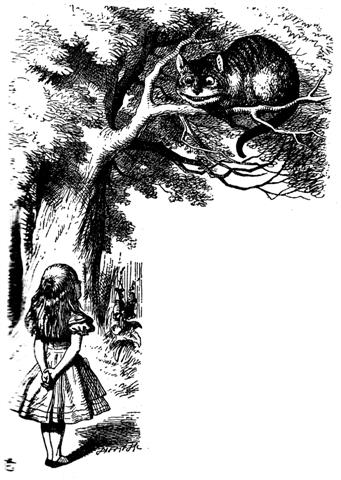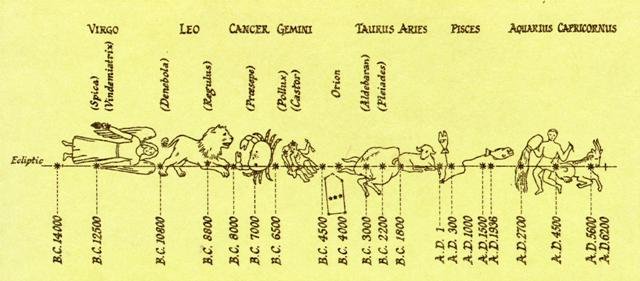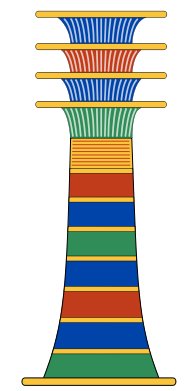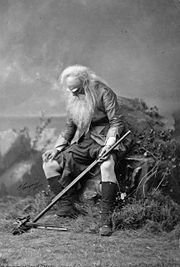The words used in Manuscript E were clearly intended to do their work on more than one level: ... The ollave in ancient Ireland had to be master of one hundred and fifty Oghams, or verbal ciphers, which allowed him to converse with his fellow-poets over the heads of unlearned bystanders; to be able to repeat at a moment's notice any one of three hundred and fifty long traditional histories and romances, together with the incidental poems they contained, with appropriate harp accompaniment; to have memorized an immense number of other poems of different sorts; to be learned in philosophy; to be a doctor of civil law; to understand the history of modern, middle and ancient Irish with the derivations and changes of meaning of every word; to be skilled in music, augury, divination, medicine, mathematics, geography, universal history, astronomy, rhetoric and foreign languages; and to be able to extemporize poetry in fifty or more complicated metres. That anyone at all should have been able to qualify as an ollave is surprising; yet families of ollaves tended to intermarry; and among the Maoris of New Zealand where a curiously similar system prevailed, the capacity of the ollave to memorize, comprehend, elucidate and extemporate staggered Governer Grey and other early British observers ... 150 + 350 = 500 → Quintus. Kinana, s. Haw., a hen that has hatched chickens. Sam., tina, a mother. Tong., tina-manu, a sow that had litter. Tah., ti'a, the lower part of the stomach, below the navel. Fiji., tina, mother; tina-tina, mother of inferior animals. N. Zeal., tinana, the buttocks, trunk, body. This word, with somewhat varying but not far separate meanings, I am inclined to consider as related to the Goth., kwens, kwino, a woman; kwina-kunds and kwineins, female; and possibly kwithus, the womb, the stomach, if that is syncope of an original kwinthus. Greek, γυνη, woman ... ... And then the bone spoke; it was there in the fork of the tree: Why do you want a mere bone, a round thing in the branches of a tree? said the head of One Hunaphu when it spoke to the maiden. You don't want it, she was told. I do want it, said the maiden. Very well. Stretch out your right hand here, so I can see it, said the bone. Yes, said the maiden. She stretched out her right hand, up there in front of the bone. And then the bone spit out its saliva, which landed squarely in the hand of the maiden. And then she looked in her hand, she inspected it right away, but the bone's saliva wasn't in her hand. It is just a sign I have given you, my saliva, my spittle. This, my head, has nothing on it - just bone, nothing of meat. It's just the same with the head of a great lord: it's just the flesh that makes his face look good. And when he dies, people get frightened by his bones. After that, his son is like his saliva, his spittle, in his being, whether it be the son of a lord or the son of a craftsman, an orator. The father does not disappear, but goes on being fulfilled. Neither dimmed nor destroyed is the face of a lord, a warrior, craftsman, an orator. Rather, he will leave his daughters and sons. So it is that I have done likewise through you. Now go up there on the face of the earth; you will not die. Keep the word. So be it, said the head of One and Seven Hunaphu - they were of one mind when they did it ...
For instance can we when reading at the beginning of page E:57 perceive words which relate to the path of the Sun - he mee o rehu (don't forget), te kekepu tokoa (also the 'kekepu creatures'), he ngaro tou piere (your people will vanish). Rehu. 1. Dust. P Mgv.: rehu, a cinder, coal, ashes. Mq.: éhuahi, ashes. Ta.: rehu, ashes, soot, any powder. 2. To omit, to forget, to faint. Rehurehu, to omit, omission, lost to sight. Hakarehu, to surprise. Rehua, unintelligible. Churchill. Mgv.: rehurehu, from early dawn to mid morning. Ta.: rehurehu, twilight. Mq.: ehuehu, id. Churchill. Mq.: ehu, to fall in bits. Ma.: rehu, to split off in chips. Ehua, Ehuo, a large constellation. Ma.: rehua, a star or planet, probably Jupiter. Churchill. Keke. To go down after reached its zenith (of the sun): he-keke te raá. Kekeé, to be lying on the ground, partly above it, to stick out: ma'ea ke'e ke'e, stones sticking out of the ground. Kékekéke, to rustle, to creak: ku-kekekeke-áte hare i te to kerau, the house creaked in the wind. Kekepu, animal mentioned in ancient traditions, the flesh of which was eaten in Hiva (also kepukepu). Kekeri, to feel an indisposition of the stomach or the bowels: he-kekeri te manava. Kekeú, shoulder (according to others, shoulder-blade); used also for 'arm'. Vanaga. Keke (ke), other, distinct, special; hikohiko keke, hide-and-seek; kekee (ke), irregular, uneven, rough; ke avai, a superlative expression; hinihini ke avai, ancient; ika ke avai, abuse; kori ke avai, abuse; maori ke avai, skilful, handy; pipiro ke avai, disgusting odor; tupu ke avai, of swift growth; ua ke avai, a shower of rain. Keekee; niho keekee, long protruding teeth. Churchill. Pau.: keke, armpit. Mgv.: keke, id. Ta.: ee, id. Mq.: kaáke, id. Ma.: keke, id. Churchill. Mgv.: keke, to praise, to felicitate. Sa.: 'e'e, to pay respect to. Ha.: ee, caressing, kind. Kekei, sharp, harsh, of the voice. To.: keke, to bleat. Ha.: eeina, to creak, to grate. Churchill. I te ahiahi-ata he garo te raá ki raro ki te vai kava. In the evening the sun disappears under the sea. Epimenides vanished down into his cave for 57 years → E:57 → 392 + 178 (the last day of "August, Hora Iti 31) = 14 * 28 + 11 * 11 + 3 * 19. ... The story of Rip Van Winkle is set in the years before and after the American Revolutionary War. Rip Van Winkle, a villager of Dutch descent, lives in a nice village at the foot of New York's Catskill Mountains. An amiable man whose home and farm suffer from his lazy neglect, he is loved by all but his wife. One autumn day he escapes his nagging wife by wandering up the mountains. After encountering strangely dressed men, rumored to be the ghosts of Henry Hudson's crew, who are playing nine-pins, and after drinking some of their liquor, he settles down under a shady tree and falls asleep. He wakes up twenty years later and returns to his village. He finds out that his wife is dead and his close friends have died in a war or gone somewhere else. He immediately gets into trouble when he hails himself a loyal subject of King George III, not knowing that in the meantime the American Revolution has taken place. An old local recognizes him, however, and Rip's now grown daughter eventually puts him up ... ... The story is a close adaptation of Peter Klaus the Goatherd by J.C.C. Nachtigal, which is a shorter story set in a German village. The story is also similar to the ancient Jewish story about Honi M'agel who falls asleep after asking a man why he is planting a carob tree which traditionally takes 70 years to mature, making it virtually impossible to ever benefit from the tree's fruit. After this exchange, he falls asleep on the ground and is miraculously covered by a rock and remains out of sight for 70 years. When he awakens, he finds a fully mature tree and that he has a grandson. When nobody believes that he is Honi, he prays to God and God takes him from this world. Note also that the family name of Honi is also a term of geometry ('M'agel' is Hebrew for 'circle maker'), as well as the family name of Rip ('Winkel' is German for 'angle'). The story is also similar to a 3rd century AD Chinese tale of Ranka, as retold in Lionel Giles in A Gallery of Chinese Immortals. In Orkney there is a similar and ancient folklore tale linked to the Burial mound of Salt Knowe adjacent to the Ring of Brodgar. A drunken fiddler on his way home hears music from the mound. He finds a way in and finds the trowes (Trolls) having a party. He stays and plays for two hours, then makes his way home to Stenness, where he discovers fifty years have passed. The Orkney Rangers believe this may be one source for Washington Irving's tale, because his father was an Orcadian from the island of Shapinsay, and would almost certainly have often told his son the tale. The original story was by Diogenes Laertius, an Epicurean philosopher circa early half third century, in his book On the Lives, Opinions, and Sayings of Famous Philosophers. The story is in Chapter ten in his section on the Seven Sages, who were the precursors to the first philosophers. The sage was Epimenides. Apparently Epimenides went to sleep in a cave for fifty-seven years. But unfortunately, 'he became old in as many days as he had slept years'. Although according to the different sources that Diogenes relates, Epimenides lived to be one hundred and fifty-seven years, two hundred and ninety-nine years, or one hundred and fifty-four years. A similar story is told of the Seven Sleepers of Ephesus, Christian saints who fall asleep in a cave while avoiding Roman persecution, and awake more than a century later to find that Christianity has become the religion of the Empire ... The 'circle maker' (Faka-taka in Polynesian, M'agel in Hebrew) ... There is a couple residing in one place named Kui and Fakataka [Creating a Circle]. After the couple stay together for a while Fakataka is pregnant. So they go away because they wish to go to another place - they go. The canoe goes and goes, the wind roars, the sea churns, the canoe sinks. Kui expires while Fakataka swims. Fakataka swims and swims, reaching another land. She goes there and stays on the upraised reef in the freshwater pools on the reef, and there delivers her child, a boy child ... was named Honi and in Polynesian Honui meant the venerable (honorable) one. Honui. 1. Person worthy of respect, person of authority. 2. Livelihood, heirloom, capital; ka moe koe ki toou hônui, you must marry to ensure your livelihood (said to a little girl); he hônui mo taaku poki, this is the heirloom for my son. Vanaga. Great (hoonui); honui, chief T.; tagata hoonui, personage; hakahonui, to praise, to commend. Churchill.
|
|||||||||||||||||||||||||||||||||||||||||||||||||||||||||||||||||||||||||||||||||||||||||





